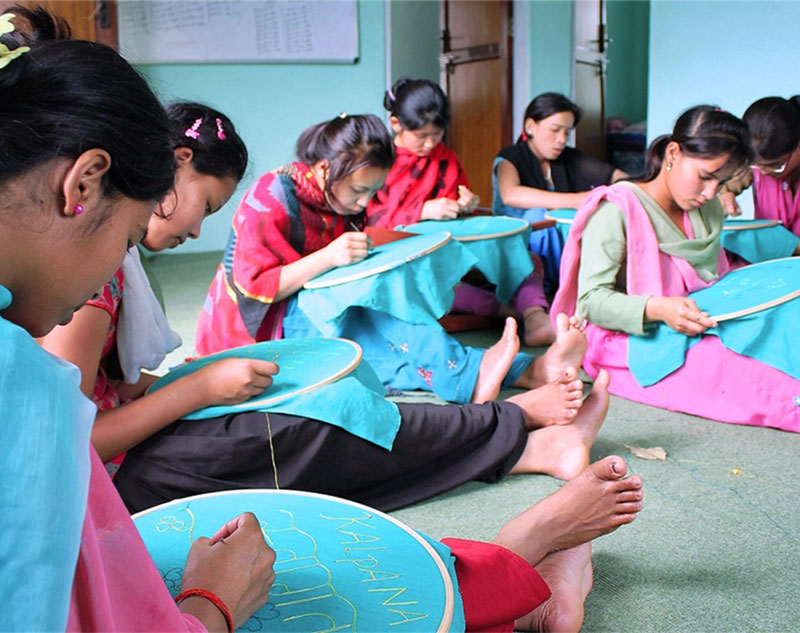Engaging rural women and girls in research processes: A discussion at the NGO Commission on the Status of Women (CSW) Forum

How do we engage rural women and girls in our research processes?
This was the question the Centre for the Study of Global Development (CSGD) focused on in our recent event at the NGO Commission on the Status of Women (CSW)67 Forum. The Forum is a platform for civil society organisations organised in parallel to the United Nations (UN) Commission on the Status of Women (CSW).
In our session, we aimed to explore why it is important to engage rural women and girls in research design – not just as voices but as active researchers, and to identify ways to overcome challenges that may occur when trying to engage with rural women and girls.
Doing research in rural areas can be expensive and access can be difficult. So, it can be easy to mainly conduct research in easily accessible urban areas. Given that one of the values of CSGD is inclusivity, it is important that no groups are ignored when designing research projects to advance sustainable development. The session was an opportunity to share some of our work in this area and to learn from each other how to do better inclusive research.
Dr Alison Buckler and Dr Margaret Ebubedike – CSGD researchers shared examples of their research where they had used participatory and co-creative methods. They spoke of their projects on educational experiences of young women and girls in Sierra Leone, Zimbabwe, Nepal, and across four nations in the Lake Chad region – Cameroon, Chad, Niger, and Nigeria. They shared these as case studies of how they had engaged with rural women and girls in their research processes.
Dr Buckler led a discussion on the challenges of meaningful inclusion of rural women and girls in research processes and how we can work around these challenges to improve our research. The Supporting Adolescents Girls’ Education (SAGE) project led by Dr Buckler used participatory filmmaking methods. Dr Buckler reminded us that the label ‘participatory’ can often be taken too lightly, and talked through the steps the international research team and participants took to reflect together on what meaningful participation would look like for each of them..
Another issue that arises when trying to do inclusive research is engaging participants in framing research questions as often research funders often require that the research question has already been set before funding the project. Navigating how to balance one’s research interests and that of the donor and the participants and there may need to be trade-offs when completing research projects.
The pandemic offered new opportunities for inclusive research as many researchers – such as from the Global North could not travel to complete their research activities in-person. This meant that the dynamics of research teams shifted, and participants were more able to shape research processes and offer new insight. Dr Buckler gave the example of a study where she was co-facilitating remotely, while the Zimbabwean researchers were ‘in the room’. The proportions of translation requirements changed and the participants spoke more freely in their home language without pausing for the translator to share what they were saying.
Dr Ebubedike explored what the impact is when research meaningfully includes rural women and girls. Research can foster agency, raise aspirations, develop capabilities, and nurture participants’ talents and leadership skills.
Dr Buckler shared that participants enjoying being part of the research is important and the idea of fun should not be overlooked as an important impact of research because many participants are giving their time to be involved in the research for free.
As we aim to do more inclusive research, Dr Ebubedike mentioned that we must recognise that this form of research is often confronted with different layers of tensions and conflicting agendas. Considering that research funding now seems to come with requirements around achieving and demonstrating broader impacts, how do we meaningfully recognise and respond to the tension between our agenda as researchers, the agenda of our funders and the genuine needs of rural women and girls we work with in some of these contexts?
We need to be intentional when planning research activities as ensuring that rural women and girls are involved in research processes can lead to them being active participants in policy decisions that affect them. We need to equitably balance these tensions to ensure we uphold the ethics and values of the communities where we work – making sure that our research continuous to remain sensitive to the context and the experiences of the people.
Dr Ebubedike while giving her final thoughts mentioned that using a co-creative approach to research in the Lake Chad project and with female trafficking survivors in Nepal and Nigeria, offered a sense of belonging to women and girls. This opened an invitation to bring critical thinking and reflection about ways knowledge is generated and used- and how women and girls can actively contribute to tackling challenges of development in ways that are meaningful and beneficial to them.
It is our plan to continue to embed inclusion while designing our research processes and to sustain our relationships with participants to have a lasting impact as inclusive research is not a one-off activity.
You can find more information on our discussions from this event in our online gallery.
Connect with us
Whatever your reasons for wanting to connect with us, you can contact us via email or social media on the addresses below
CSGD email
CSGD on Bluesky
CSGD on LinkedIn
Sign up to our mailing list to receive the latest news on our research, events and publications.
.jpg)